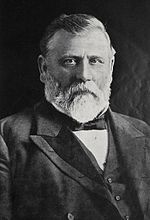| |||||||||||||||||||||||||||||||||||||
All 80 seats in the New Zealand House of Representatives 41 seats were needed for a majority | |||||||||||||||||||||||||||||||||||||
|---|---|---|---|---|---|---|---|---|---|---|---|---|---|---|---|---|---|---|---|---|---|---|---|---|---|---|---|---|---|---|---|---|---|---|---|---|---|
| Turnout | 76.7% | ||||||||||||||||||||||||||||||||||||
| |||||||||||||||||||||||||||||||||||||
 Results of the election. | |||||||||||||||||||||||||||||||||||||
| |||||||||||||||||||||||||||||||||||||
The 1902 New Zealand general election was held on Tuesday, 25 November, in the general electorates, and on Monday, 22 December in the Māori electorates to elect a total of 80 MPs to the 15th session of the New Zealand Parliament. A total number of 415,789 (76.7%) voters turned out to vote.[2]
The Rev Frank Isitt was nominated as the Prohibitionist candidate for ten separate electorates, and came second in eight. Another candidate, David Whyte, was nominated for two. Both men stood to ensure that a local liquor licensing poll was held in each electorate for which they were nominated.
- ^ Gustafson, Barry. "Massey, William Ferguson". Dictionary of New Zealand Biography. Ministry for Culture and Heritage. Retrieved 10 December 2011.
- ^ "General elections 1853-2005 – dates & turnout". Elections New Zealand. Archived from the original on 14 November 2014. Retrieved 12 January 2011.
Cite error: There are <ref group=nb> tags on this page, but the references will not show without a {{reflist|group=nb}} template (see the help page).

